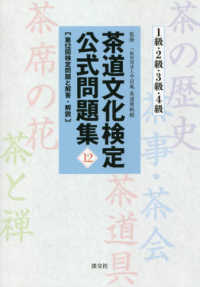Full Description
What can a study of international film contribute to our understanding of education in a globalized context? How can such an exploration further push the boundaries of comparative and international education (CIE) as an academic field?
In addressing these questions, Irving Epstein brings together insights from film theory, affect theory and CIE to explore the ways in which educational meanings are mediated through globalization processes. Some of the many films discussed in detail in the book include Parasite, Small Axe, My Octopus Teacher, The Pearl Button, and A Separation. Epstein shows how films can speak broadly to issues involving social class privilege, racism, colonialism and indigeneity, and environmental justice regarding educational concerns.
Contents
Series Editors' Foreword
Acknowledgements
Introduction
Part I: Theoretical Musings
1. Engaging in Comparison: The Power of Affect
2. Film, Comparative and International Education, and Affect: Some Theoretical Considerations
3. Globalization, Commodification, and Affect
Part II: Case Studies
4. Social Class: Oppression and Aspiration
Parasite (Gisaenchung)
A Separation (Jodaeiye Nader az Simin)
Still Life (San Xia Hao Ren)
5. Racism and the Struggle to Assert Identity
The Underground Railroad
Small Axe
Tsotsi
6. Indigeneity/Colonialism: Cultural Elimination and Resistance
Rabbit Proof Fence
We Were Children
The Pearl Button (El botón de nácar)
7. Environmental Consciousness: Exploiting, Understanding, Respecting the Natural World
Anthropocene: The Human Epoch
My Octopus Teacher
Heart of Sky, Heart of Earth
Concluding Remarks
References





